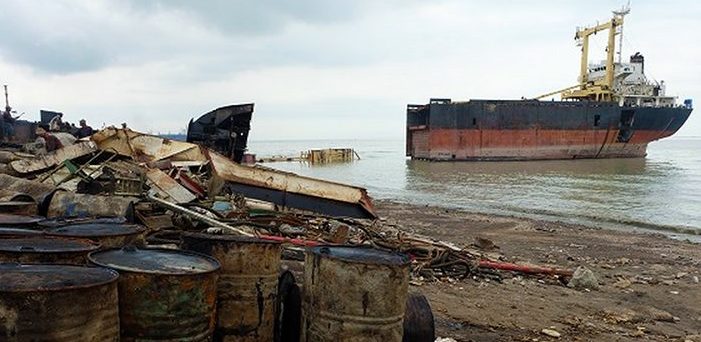Explosion Sinks Sanctioned Russian Cargo Ship in the Mediterranean Sea
An explosion in the Mediterranean Sea sank a sanctioned Russian cargo ship, the Ursa Major, on Monday night, according to Russian authorities. The incident, which occurred south of Spain, has left two crew members missing and prompted an investigation into the cause of the blast.

The crisis center of the Russian Foreign Ministry confirmed the sinking of the Ursa Major, stating that the explosion originated in the vessel’s engine room. The ship had been navigating the Mediterranean after passing through the Strait of Gibraltar, a key maritime chokepoint connecting the Atlantic Ocean to the Mediterranean and separating Europe from Africa.
Details of the Incident
The explosion reportedly took place late Monday night, catching the 16-member crew off guard. Fourteen crew members were rescued and transported to a Spanish port, where they received medical attention. However, two individuals remain unaccounted for, sparking a search-and-rescue operation coordinated by Spanish maritime authorities.
In a statement, the Russian Foreign Ministry expressed concern over the incident and emphasized its urgency in locating the missing crew members. “The loss of the Ursa Major and the unaccounted-for crew is a tragedy. We are coordinating with Spanish authorities to investigate the cause and ensure the safety of our sailors,” the statement read.
The Ursa Major and Its Controversial Voyage
The Ursa Major, a cargo ship operated under Russian flags, had been under international sanctions due to its connections with Russia’s broader maritime industry. These sanctions, imposed by Western nations, are part of ongoing measures to limit Russia’s global economic activities amid geopolitical tensions.
The ship’s journey through the Strait of Gibraltar had already attracted scrutiny, as its sanctioned status meant heightened monitoring by international authorities. The vessel was reportedly transporting goods destined for Russia, although the exact nature of its cargo has not been disclosed.
Search and Rescue Efforts
Spanish maritime rescue teams swiftly mobilized following the explosion, deploying helicopters and rescue boats to the area. Despite their prompt response, challenging conditions in the Mediterranean, including strong currents and low visibility, have complicated the search for the missing crew members. The rescued sailors are currently being interviewed by Spanish authorities to gather more details about the circumstances leading to the explosion.
A spokesperson for Spain’s Maritime Safety and Rescue Agency said, “We are doing everything in our power to locate the missing individuals. The rescued crew members are safe, and we are working closely with Russian officials to understand what happened.”
Possible Causes of the Explosion
While the exact cause of the blast remains unclear, maritime experts have speculated on several possibilities. Engine room explosions can result from mechanical failure, fuel leaks, or improper maintenance. Given the Ursa Major’s sanctioned status, there are also questions about whether the ship’s operational standards were compromised due to limited access to international maintenance services.
Others have raised the possibility of foul play, citing the heightened geopolitical tensions surrounding Russian vessels. However, no evidence has been presented to support such claims, and investigators are keeping all options open as they examine the wreckage.
Broader Implications
The incident comes at a time of increasing scrutiny on Russian maritime activities. Western nations have ramped up sanctions on Russian shipping to exert economic pressure, leading to challenges in maintaining and insuring Russian vessels. The Ursa Major’s sinking underscores the vulnerabilities faced by sanctioned ships operating under restricted conditions.
In Moscow, the sinking has sparked a wave of concern and condemnation. Russian officials have called for a thorough investigation and demanded assurances from Spain regarding the safety of the rescued crew. “This incident highlights the risks our vessels face in international waters under current geopolitical conditions,” said a representative from Russia’s Ministry of Transport.
Humanitarian Concerns
The fate of the two missing crew members has drawn attention to the human cost of the incident. Family members of the sailors have urged authorities to intensify search efforts and provide updates on the investigation. “We just want to know they’re safe,” one relative told Russian media.
International organizations, including the International Maritime Organization (IMO), have also expressed concern over the incident. An IMO spokesperson stated, “We are monitoring the situation closely and extend our support to the ongoing rescue and investigation efforts.”
Next Steps
As search-and-rescue operations continue, attention is turning to the investigation into the explosion. Experts are expected to analyze debris from the wreckage to determine the cause of the blast. Both Russian and Spanish authorities have pledged to work together to uncover the truth behind the incident.
In the meantime, the sinking of the Ursa Major serves as a stark reminder of the risks faced by vessels navigating geopolitically charged waters. With two crew members still missing and questions lingering about the explosion’s cause, the incident is likely to remain a focal point in international maritime discussions in the coming weeks.
Author: shipping inbox
shipping and maritime related web portal








